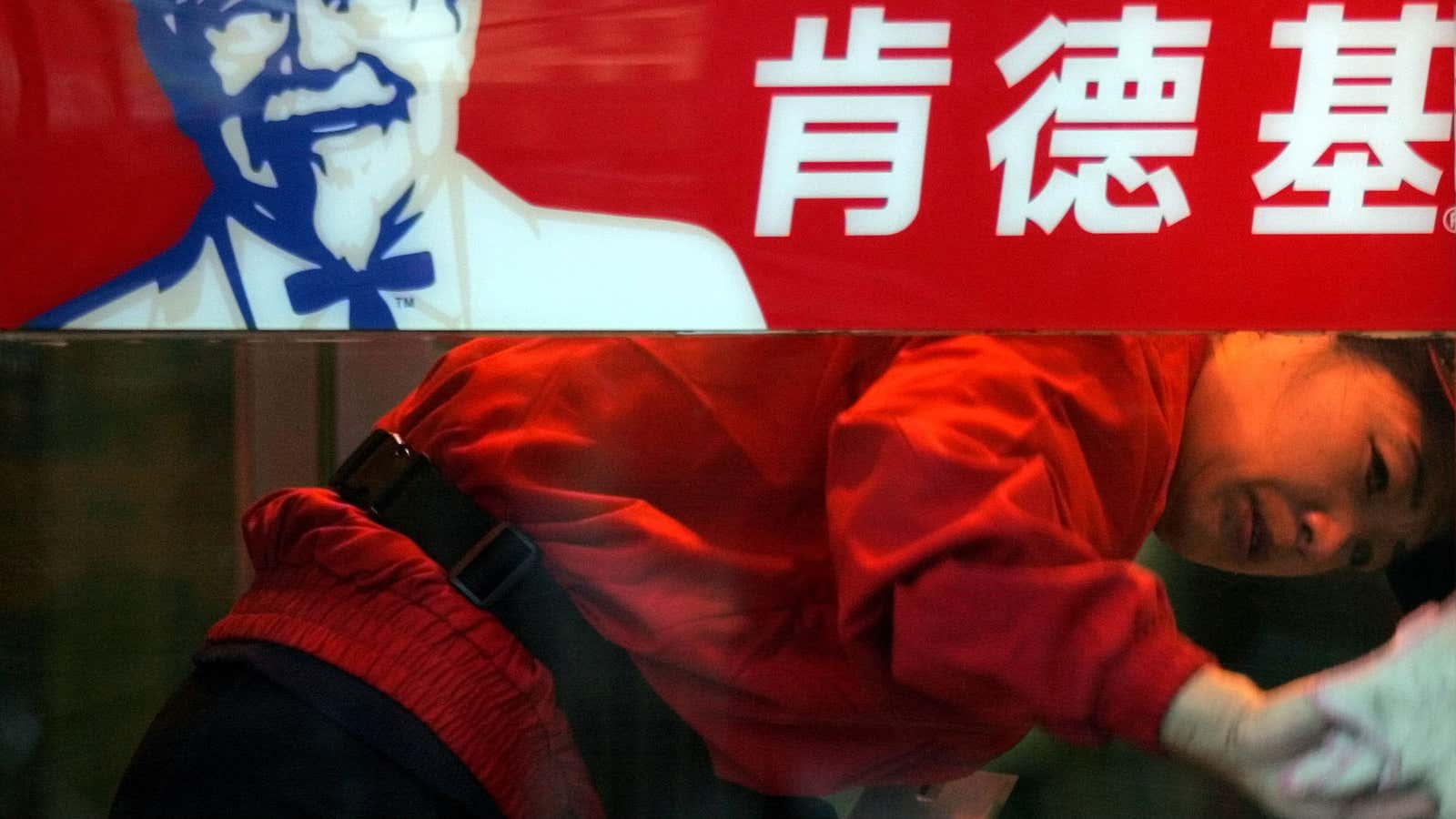When Yum Brands announced last month that it expected KFC-China’s fourth-quarter sales to decline 4%, spurring a sharp sell-off in the company’s stock, CEO David Novak attributed it the slump to “the macros”—meaning, the much-discussed sputtering of China’s economic growth.
But that wasn’t the whole story. Days before Yum’s revised estimate, the Chinese state television network CCTV reported (in Chinese) on KFC’s sourcing of “fast-growth chickens,” birds dosed with “toxic” concoctions to shorten their maturation cycle. The Chinese micro-blogosphere promptly freaked out, but the charge didn’t stick: Health inspectors cleared the “fast-growth chickens,” which turned out to be the overseas industry standard, imported from the United States.
But CCTV wasn’t done. On Tuesday, it ran an investigative piece on large-scale chicken farmers, highlighting their insouciant way with antibiotics and growth hormones. Though KFC and McDonald’s, which was also implicated, both say they haven’t sourced from those kinds of farms in months, it matters little to public perception. When it comes to food safety, these ongoing reporting campaigns are fairly common, explains Beijing-based lawyer and blogger Stan Abrams:
Seems like every other day I’m writing something about a new investigation, enforcement campaign, or dispute involving a foreign firm here. Some times the criticism turns out to be fair, and other times the rumors are unfounded. Occasionally there are witch hunts, where the media (often, but not always State media) piles on with inflammatory rhetoric, assuming the worst of multinationals and their business practices.
In this case, says Abrams, “China’s print media seem to be focused not on the farmers or their customers as a whole, but rather on KFC and McDonald’s.” For example, the China Daily has now begun rehashing KFC- and McDonald’s-related stories with titles like “Multinational firms’ tricks” and “Some foreign fast food is harder to swallow.”
This is fairly typical, particularly of CCTV, which sees itself as a consumer watchdog. What isn’t typical is that the Chinese government is now taking up the cause against Yum and KFC. Earlier today, the Shanghai Food and Drug Administration released (in Chinese) food safety reports from 2010 and 2011, showing that, of 19 samples from one of the farms profiled by CCTV, 8 failed antibiotics safety tests.
“We think Yum Brands should face facts and responsibly publish relevant information,” Shanghai FDA manager Yan Zuqiang told the 21st Century Business Herald. “What is now clear is that we’ve already had in our hands eight reports of samples that didn’t meet standards, and we immediately informed Yum Brands. Yum Brands should admit to this.”
Though the report hasn’t been widely published in English yet, the stock shed some 4% in trading on Friday. Yum Brands representatives did not respond to requests for comment.
It’s not clear what the government hoped to clarify by releasing tests that more than a year old from a farm that KFC no longer uses, particularly when the Shanghai FDA says it will publish recent test results in a few days. It’s possible this signals a prioritization of food safety in the new Xi Jinping administration, says Junheng Li, head of research at China-focused research firm JL Warren Capital, though she thinks that KFC-China’s real problem has little to do with government attention.
“KFC-China was successful back in the day because they localized their menu, adapting it to local taste,” Li told me. “Among younger demographics in first- and second-tier cities, chicken has been around for too long, so that now, trendy Chinese food concepts are outperforming KFC and other foreign fast foods.”
Yum’s 5,000 restaurants in China are growing revenue faster than the company’s larger base of locations in the US. But shopping centers are no longer discounting rents for KFCs, says Li, meaning that the company is facing 100-250% hikes, wringing margins. Then there’s the reality that young shoppers are increasingly spending their renminbi online, where e-retailers like Taobao and 360buy.com offer selection, price transparency, and convenience that traditional shopping centers struggle to compete with. KFC-China’s plan to combat these trends is to expand in lower-tier cities, where markets are not yet saturated.
But Li sees problems with this strategy, a point that gets back to “the macros” that CEO Novak believes will support KFC-China’s continued growth.
“KFC shares the common attitude toward China, saying ‘urbanization will drive growth,’ and leaving it at that,” she says. “Urbanization isn’t the driver of economic growth; it’s the result of it. You have to create jobs first. And with the economy so dependent on exports and investment, creating overcapacity, the current rate of urbanization is unsustainable.”
